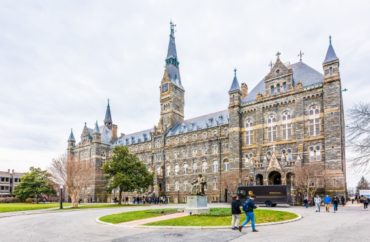
WASHINGTON, D.C. — Georgetown University students on Thursday voted to approve a new student fee to create a fund for the descendants of slaves sold by the university in the 1830s.
The vote’s results were announced after a contentious day on campus with proponents of the measure hosting a rally on campus, chanting “when they don’t act — we fight back,” and encouraging students to get out the yes vote.
Some opponents of the measure, meanwhile, told The College Fix their fliers explaining arguments against the referendum were torn and discarded and that they felt scared to voice their opinions.
Of the 3,845 students who voted in the spring election, 2,541 students — or 66.08 percent — voted to approve the measure, according to the official announcement of the results presented by the Georgetown University Student Association Election Commission late Thursday night.
The results of the referendum are as follows: 66.08% for yes (2541 votes), 33.92% for no (1304 votes). This means that the referendum passes.
— GUSA Election Commission (@GUSAElections) April 12, 2019
The turnout is considered among the highest ever for the private, Catholic institution.
The proposal, put forth by Georgetown University Student Association senators in coordination with the GU272 Movement, is one step closer to becoming the first slavery reparations policy in America. It calls for the establishment of a fund for the ancestors of the 272 men, women and children sold by Georgetown in 1838.
The student resolution will now be considered by the Board of Directors, which will likely have the ultimate authority on whether the fee will be officially implemented.
According to the measure, the semesterly fee would begin to be collected in the fall of 2020 and start at $27.20 per student in honor of the 272 people sold by Georgetown.
During the afternoon as the voting took place, roughly 40 students rallied to support and defend the measure.
“I think it’s an excellent example of student activism and student action,” student Kakazi Kacyira told The College Fix on why she supported the referendum.
Freshman Robert Nishimwe said he supported it because “we all benefit from this history.”
“… For me it’s really not only a moral question, a values question, but it’s just the right thing to do in my opinion,” he said. “So I’m supporting this because I think that you can’t just bring out apologies, ‘I’m sorry for what happened, blah blah,’ but you have to put a check to that, you know, you have to put something tangible to that apology. I think that’s a way in which we are trying to do that.”
Opponents criticized the lack of oversight and clarity of the funds’ use, burden on low-income students, and the compulsory nature of the policy.
GUSA Senator Sam Dubke, who led the “Vote No” movement from the chamber, reacted to the results by telling The College Fix he was unsurprised but disappointed in the tactics of the other side.
“I was called racist both on social media and in GUSA Senate meetings while my campaign posters were ripped in half,” he said. “The other side worked hard, they wanted to win and they did, but at the end of the day the rules are the rules and a lot of complaints were filed. I would not be surprised if they end up in some kind of suit.”
The precise wording of the measure presented to students on the ballot stated:
A “Yes” vote on the referendum would recommend to the Georgetown Board of Directors a GU272 Reconciliation Contribution and Board of Trustees.
A “No” vote on the referendum would not recommend to the Georgetown Board of Directors a GU272 Reconciliation Contribution and Board of Trustees.
The proposal advocates that beginning in Fall 2020, undergraduate students would contribute $27.20 to honor and memorialize the GU272. The funds raised by the GU272 Reconciliation Contribution will be allocated for charitable purposes that benefit the descendants of the GU272 and others once held in slavery by the Maryland Jesuits. Similar to the student activities fee, the referendum recommends that the contribution should be adjusted annually for inflation. It further recommends special consideration for causes and proposals that directly benefit descendants still residing in underprivileged communities. To facilitate these charitable projects, the referendum recommends the creation of a GU272 Reconciliation Board of Trustees, which would consist of five GU undergraduate representatives and five representatives of the descendents of the GU272.
Over the past few years, Georgetown has worked to reckon with its legacy of slavery. It officially apologized for the sale in April 2017. Campus officials also renamed two buildings named after the Jesuits involved in the sale of the slaves, and created an African American Studies Department. The university also agreed to “offer an admissions edge to descendants of slaves as part of a comprehensive atonement” for the school’s past actions.
MORE: Georgetown students may pay reparations for slavery with new student fee
IMAGE: Shutterstock
Like The College Fix on Facebook / Follow us on Twitter






Please join the conversation about our stories on Facebook, Twitter, Instagram, Reddit, MeWe, Rumble, Gab, Minds and Gettr.